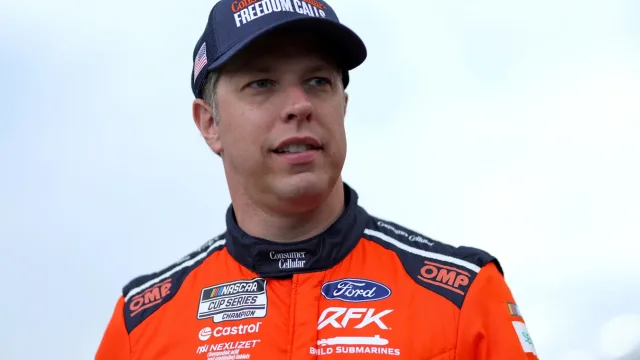Brad Keselowski on NASCAR road courses has become a central topic after the veteran driver and RFK Racing co-owner described the rising number of such tracks as a threat to the sport’s traditional oval heritage, following a major accident in Chicago. The incident at the Chicago Street Course brought heightened attention to Keselowski’s concerns about NASCAR’s evolution, especially as the series considers further road course additions.
Keselowski Voices Concerns Over NASCAR’s Direction
Brad Keselowski, a 41-year-old racing driver and co-owner at Roush Fenway Keselowski Racing, has openly challenged the current trend of expanding road courses within NASCAR. Keselowski has achieved 36 victories in the NASCAR Cup Series, with signature wins at marquee events such as the Coca-Cola 600, Brickyard 400, and Southern 500. Speaking after the recent accident in Chicago, Keselowski emphasized the sport’s foundation, pointing out that NASCAR’s roots are embedded in oval racing, not road courses.
The debate intensified after motorsports reporter Pete Pistone posted on X, noting that fan demand played a role in the shift toward more road course events. Pistone observed:
“The criticism from some today about “too many” road courses is ironic to me because fans literally strongly asked for more just a handful of years ago – so many callers to the channel and as this story reminds on other platforms.”
Keselowski replied, outlining his unease about the growing road course presence and its implications for the sport’s identity:
“We went from 2 to 6 Road course races, Possibly 7 next year. NASCAR was successfully built as a primarily oval racing series. IMSA was built as the primary road course series in North America. IMSA will always do road racing better than NASCAR and that’s ok. Yes, TOO Many Road courses in NASCAR.”
His remarks underscored a broader discussion within the racing community, suggesting both fans and drivers are wrestling with how to marshal support for NASCAR’s historic character while recognizing the skills required on various tracks. Keselowski also referenced IMSA, acknowledging its role as North America’s premier road racing series.
The Chicago Street Course Incident Adds Fuel to the Debate
The controversy around Brad Keselowski on NASCAR road courses gained new momentum after his 2025 Cup Series effort in Chicago ended early. A chaotic crash unfolded on lap four of the Chicago Street Course when Carson Hocevar struck the wall coming out of turn 10, spinning and blocking the street’s narrow path. While Keselowski tried to avoid the mess by braking, he was hit from behind by Daniel Suarez and pushed into the pileup, which ultimately involved drivers such as Austin Dillon, Todd Gilliland, AJ Allmendinger, Will Brown, and Riley Herbst.
As a result, Keselowski’s #6 ford/”>Ford Mustang suffered a broken left front suspension. This forced him to retire from the race, marking his sixth early exit of the 2025 season. Reflecting on the event, Keselowski explained to Bob Pockrass:
“Wrong spot, wrong time. The #77 (Carson Hocevar) wrecked and blocked the track. I was going to get stopped to not hit him, or if I was going to, it was going to be light, then like three cars came from behind and blasted us.”
“It broke the left front suspension off the car. It’s a shame we never got a chance to show what we had. I thought we were pretty good, but that’s just how it goes,” he added.
This crash highlighted how racing on a city street circuit presents unique challenges. Narrow layouts and limited visibility commonly found on road courses mean that even the best drivers, like Keselowski and others in the pileup, can become entangled in incidents with little warning.
What Comes Next for NASCAR’s Identity
The ongoing debate featuring Brad Keselowski on NASCAR road courses brings sharper focus to the tension between innovation and tradition. Key figures such as Carson Hocevar, Daniel Suarez, and Austin Dillon have all been caught up in events that exemplify the hazards and unpredictability of street and road courses. While advocates like Pete Pistone point to previous fan demand for more variety, Keselowski’s concerns resonate with those who value the oval track’s heritage.
As NASCAR continues to evaluate its schedule, the organization faces pivotal decisions that could reshape how fans, drivers, and teams perceive the balance of races. The outcome will likely influence everything from race strategy and driver preparation to the type of excitement that defines the Cup Series moving forward, ensuring the debate around tradition versus change remains at the forefront.
Our Reader’s Queries
Q. Is Brad Keselowski Polish?
A. Facebook. Best wishes to Brad Keselowski, a seasoned NASCAR driver with Polish roots, who will compete in the NASCAR Chicago races this weekend. Brad drives the No. 6 Ford Mustang Dark Horse as a full-time participant in the NASCAR Cup Series.
